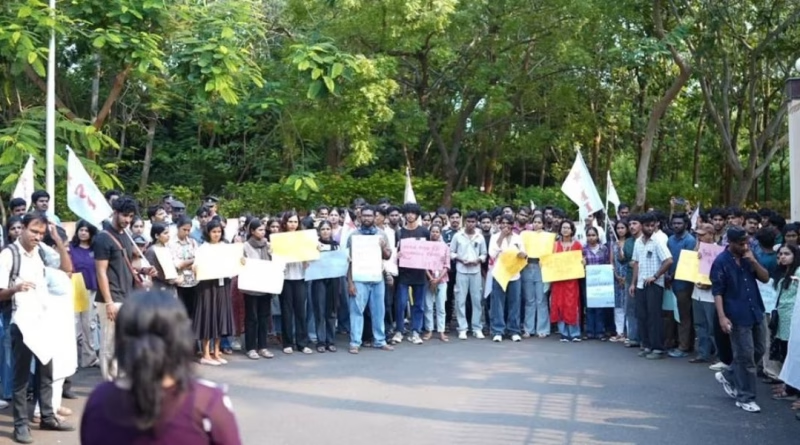Pondicherry University Protest – Students Demand Justice Over Alleged Sexual Harassment Case
Introduction – Tensions Erupt at Pondicherry University
The usually serene campus of Pondicherry University turned into a flashpoint of dissent on Thursday as students clashed with police during a protest against alleged sexual harassment and administrative negligence. What began as a peaceful sit-in organized by the Students’ Federation of India (SFI) spiraled into chaos after 24 students, including six women, were detained by law enforcement officers.
The students accused Professor Madavaiah, Head of the university’s Karaikal branch, of sexually harassing female students and condemned the administration’s failure to act. The protest, which lasted nearly eight hours, reflected deep frustration over what students called the “institutional silence” on harassment cases.
Background of the Incident
The spark behind the protest came from allegations that Professor Madavaiah had engaged in repeated sexual misconduct toward female students. Complaints were reportedly lodged with the Internal Complaints Committee (ICC) — a body tasked with investigating harassment claims within universities — but students allege that no meaningful action was taken.
The Role of the Accused – Professor Madavaiah
As the Head of the Karaikal branch, Professor Madavaiah holds a senior academic position. The accused has not yet publicly responded to the allegations, but his continued presence within the institution has angered many students who feel unsafe.
Failure of the Internal Complaints Committee (ICC)
Students claim the ICC failed in its primary duty to ensure a fair investigation. They argue that the committee’s inaction reflects a systemic issue: power dynamics and lack of transparency in addressing sexual harassment within academic institutions.
Timeline of the Protest
Initial Peaceful Sit-in and Broken Promises
The protest began around 12 p.m. on Thursday, when students gathered near the administrative block demanding immediate action. They were initially assured that a meeting would be held with the Vice-Chancellor (VC) and Registrar in the evening. However, only the Dean of Students’ Welfare (DSW) met with them, and the dialogue reportedly ended without any concrete resolution.
Escalation and Police Intervention
Frustrations grew as students discovered that the Vice-Chancellor had left the campus without addressing them. In response, they blocked the entrance, preventing senior officials from leaving. The situation escalated when the Officer on Special Duty (OSD) failed to defuse tensions, prompting police to forcibly disperse the crowd. By nightfall, 24 protesters had been detained, including six women.
Students’ Federation of India (SFI) Response
The SFI, which organized the demonstration, released a scathing statement condemning both the university administration and police action. The organization accused authorities of “silencing the voices of victims and protesters while shielding the accused.”
Key Demands of the SFI
- Immediate suspension of the accused professor.
- Transparent investigation by an independent committee.
- Release of detained students without conditions.
- Accountability from university officials, including the Vice-Chancellor and Registrar.
- Implementation of stronger anti-harassment mechanisms within the university.
The SFI also announced that the agitation would continue until all demands were met.
Police Action and Detentions
Police officials confirmed that 24 students were detained and taken to Kalapet police station for questioning. Eyewitnesses and student organizations claimed that police manhandled several protesters during the crackdown. Visuals circulating on social media show students being dragged away from the protest site, sparking outrage among student unions nationwide.
University Administration’s Silence
As of Friday morning, Pondicherry University authorities had not issued an official statement on the matter. The administration’s silence has drawn widespread criticism, with many arguing that it reflects a culture of avoidance and institutional apathy toward harassment allegations.
Campus Safety and Accountability
The incident has reignited national conversations about gender safety in higher education. Many universities in India have faced similar criticism for failing to protect complainants and for conducting internal inquiries lacking transparency. The University Grants Commission (UGC) mandates every campus to have an active ICC, but effectiveness varies widely.
Voices from the Ground – Student Reactions
Several students expressed their frustration online.
“Those who raise their voices are punished, while the accused enjoy protection,” said one student in a viral post.
Others demanded justice and reform, calling for greater female representation in decision-making roles within the university’s governing bodies.
Broader Implications for Higher Education in India
The Pondicherry University protest is not an isolated case — it highlights systemic failures across academic institutions. The lack of accountability mechanisms allows powerful individuals to evade scrutiny, discouraging victims from coming forward. It also underscores the urgent need for cultural change within universities to prioritize safety over reputation.
Government and Legal Oversight
Human rights groups and student unions have called upon the Puducherry government and Ministry of Education to intervene. Legal experts argue that if the ICC has indeed failed in its duty, statutory action under the Sexual Harassment of Women at Workplace (Prevention, Prohibition and Redressal) Act, 2013 could be warranted.
The Road Ahead – Possible Resolutions
To restore faith among students and staff, the following steps are essential:
- A transparent inquiry into the allegations.
- Immediate release of detained students.
- A reconstituted ICC with external members.
- Sensitization programs for faculty and students.
Only decisive and fair action can help the university rebuild its reputation as a safe, inclusive academic space.
FAQs on Pondicherry University Protest
1. Why did students protest at Pondicherry University?
Students protested against the administration’s failure to act on sexual harassment allegations against a senior professor.
2. How many students were detained?
A total of 24 students, including six women, were detained by police.
3. What is the SFI’s role in this protest?
The Students’ Federation of India organized and led the protest, demanding justice and accountability.
4. Has the accused professor been suspended?
As of now, there has been no official confirmation of any suspension or disciplinary action.
5. Did the Vice-Chancellor meet the students?
No. The VC reportedly left the campus before meeting the protesters, further escalating tensions.
6. What happens next?
Student unions plan to continue their agitation until their demands are fulfilled and justice is ensured.
Conclusion – A Call for Accountability and Reform
The Pondicherry University protest is a stark reminder that justice delayed is justice denied. Universities must not only educate minds but also protect their communities. The administration’s silence speaks volumes, but so does the courage of students who refused to remain quiet.
As the issue unfolds, one thing is clear: the fight for accountability and safety in Indian universities has only just begun.
External Link:
Read more on the developing story at The Hindu – Pondicherry University Protest Report.


